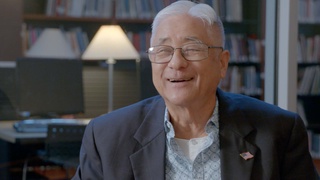Interviews
What I wanted to pass down to my children (Japanese)
(Japanese) Since they were young, I counted on my wife to raise our children. There would be times that I couldn’t help but be away [from home] due to work. [Working] from early morning to late at night—it was difficult to find a chance to spend some quality time with my kids and talk with them. I did try my best to take vacations to go on trips together as a family, but things like lecturing life lessons to my kids… I don’t recall telling my kids anything of the sort. There were discussions between my wife and me about it—about how we should be raising the kids and such. But I don’t think we did very often. In my heart, I feel that I wanted to tell my kids to have awareness that they are Japanese. It’s not something like “you have to do this or that because you’re Japanese,” but more like having a Japanese consciousness, that sort of thing. I think I was able to pass that on to my children, at least to some degree.
Date: June 17, 2008
Location: California, US
Interviewer: Yoko Nishimura
Contributed by: Watase Media Arts Center, Japanese American National Museum
Explore More Videos

My daughter couldn’t fit in Japan, so I decided to go back to America (Japanese)
(b. 1936) Shin-issei welding business owner

Unique Identity from Having Multiple Backgrounds
(b. 1938) Philipines-born hikiagesha who later migrated to the United States.

Growing up Japanese in Hawaii
(b. 1952) Former banking executive, born in Hawaii



Parents identification as Peruvian Okinawan
Okinawan American whose parents are from Peru.

Okinawan cultural appreciation
Okinawan American whose parents are from Peru.

Prejudice against Okinawans from mainland folks
Okinawan American whose parents are from Peru.

American values she aligns with
Okinawan American whose parents are from Peru.

Working together in Okinawa using three languages
Okinawan American whose parents are from Peru.

Expressing herself through poetry
(b. 1923) Japanese American poet, activist

About Escobar (Spanish)
(b. 1962) Nisei Japanese Argentinian, currently residing in Japan

Her definition of Nikkei
(b.1974) Japanese Colombian who currently resides in the United States

His sister Kiyo was like a second mother to him
(b. 1942) Japanese Peruvian incarcerated in Crystal City

How he met his wife
Professor of Law, University of Sao Paulo, Lawyer, Translator (b. 1948)
